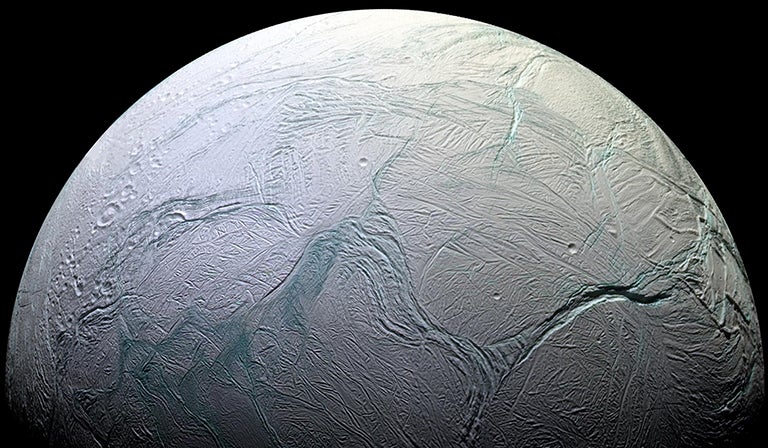Scientists ‘confident’ that Saturn’s moon has the ingredients for alien life
The presence of phosphorus in a subsurface ocean could be home to extraterrestrials

Your support helps us to tell the story
From reproductive rights to climate change to Big Tech, The Independent is on the ground when the story is developing. Whether it's investigating the financials of Elon Musk's pro-Trump PAC or producing our latest documentary, 'The A Word', which shines a light on the American women fighting for reproductive rights, we know how important it is to parse out the facts from the messaging.
At such a critical moment in US history, we need reporters on the ground. Your donation allows us to keep sending journalists to speak to both sides of the story.
The Independent is trusted by Americans across the entire political spectrum. And unlike many other quality news outlets, we choose not to lock Americans out of our reporting and analysis with paywalls. We believe quality journalism should be available to everyone, paid for by those who can afford it.
Your support makes all the difference.Saturn’s moon, Enceladus, has oceans that are rich with the materials needed to generate life, a new study has suggested.
“Enceladus is one of the prime targets in humanity’s search for life in our solar system,” said Dr Christopher Glein from the Southwest Research Institute, who studies extraterrestrial oceanography.
“In the years since Nasa’s Cassini spacecraft visited the Saturn system, we have been repeatedly blown away by the discoveries made possible by the collected data.”
The spacecraft studied plumes of ice grains and water vapour bursting through the surface of the moon and found that there is likely to be huge quantities of dissolved phosphorus – although the element is yet to be identified directly – which is essential for the development of DNA and RNA.
Planets like Earth – with surface oceans – must exist a particular distance from their host star in order to avoid overheating or freezing, known as the ‘Goldilocks Zone’. However, planets with subsurface oceans can potentially produce life at greater extremes and thus expands the probability that we will discover life on other planets.
“The quest for extraterrestrial habitability in the solar system has shifted focus, as we now look for the building blocks for life, including organic molecules, ammonia, sulfur-bearing compounds as well as the chemical energy needed to support life,” Dr Glein said.
“Phosphorus presents an interesting case because previous work suggested that it might be scarce in the ocean of Enceladus, which would dim the prospects for life.”
The research suggest that a new probe be sent to Enceladus to investigate the habitable ocean. “The underlying geochemistry has an elegant simplicity that makes the presence of dissolved phosphorus inevitable, reaching levels close to or even higher than those in modern Earth seawater,” Dr Glein continued. “What this means for astrobiology is that we can be more confident than before that the ocean of Enceladus is habitable.”
Saturn is not the only planet that might have life in its vicinity; the presence of ammonia has also led some researchers to suggest that Venus could have alien life in its sulfuric atmosphere “very unlike anything we’ve seen”
While the planet itself is too hot to have life, there could be microscopic organisms in the clouds, producing ammonia to neutralise the acidity in the same way that animals on Earth do.
The research has been published in PNAS, a journal of the National Academy of Sciences.



Join our commenting forum
Join thought-provoking conversations, follow other Independent readers and see their replies
Comments